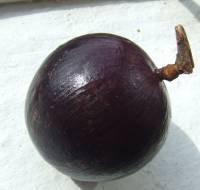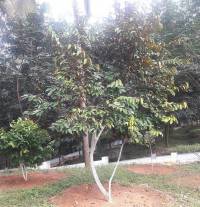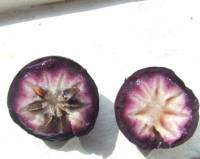This is an old revision of the document!
Star apple
| Botanical Information |
| Order | Ericales |
| Family | Sapotaceae |
| Genus | Chrysophyllum |
| Common Name | Star apple |
| Species | C. cainito |
Maturity days
Planting Months
| Planting months |
| Jan | Feb | Mar | Apr | May | Jun | Jul | Aug | Sep | Oct | Nov | Dec |
| X | X | X | X | X | X | X | X | X | X | X | X |
Permaculture uses
| Permaculture uses |
| Usage 1 | Usage 2 | Usage 3 |
| | Food_Forest | Fruit |
| Growing Condition | Comment |
| Drought Tolerant | No |
| Humidity tolerant | Yes |
| Planting area | Ground |
| Sunlight | Full_sun |
Photos
Tropical tree, grows in Townsville.
It grows rapidly and reaches 20 m in height. The leaves are evergreen, alternate, simple oval, entire, 5–15 cm long; the underside shines with a golden color when seen from a distance. The tiny flowers are purplish white and have a sweet fragrant smell. The tree is also hermaphroditic (self-fertile). It produces a strong odor. The fruit is globose and typically measures from 2 to 3 inches in diameter.[2] When ripe, it usually has purple skin with a faint green area appearing around the calyx. A radiating star pattern is visible in the pulp. Greenish-white and yellow-fruited cultivars are sometimes available. The skin is rich in latex, and both it and the rind are not edible. The flattened seeds are light brown and hard. It is a seasonal fruit bearing tree. The fruits are used as a fresh dessert fruit; it is sweet and often served chilled. Infusions of the leaves have been used against diabetes and articular rheumatism. The fruit has antioxidant properties.[3][4] The bark is considered a tonic and stimulant, and a bark decoction is used as an antitussive. The fruit also exists in three colors, dark purple, greenish brown and yellow. The purple fruit has a denser skin and texture while the greenish brown fruit has a thin skin and a more liquid pulp; the yellow variety is less common and difficult to find. A number of closely related species, also called star apples, are grown in Africa including C. albidum and C. africanum.[5] In Vietnam, the most famous variety is Lò Rèn milk fruit coming from Vĩnh Kim commune, Châu Thành District, Tiền Giang Province. In Sierra Leone the fruit is referred to as “Bobi Wata” or Breast Milk Fruit.


